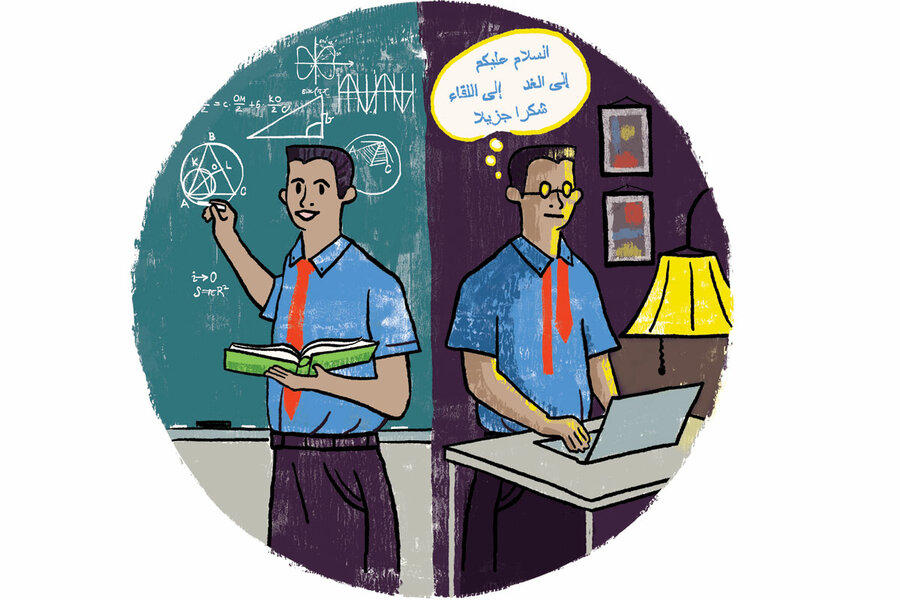Language lesson: A professor learns the power of praise
Loading...
I am a university professor, I make my living by teaching. Last year, though, I decided to become a student and signed up for online Arabic classes.
Arabic is a notoriously hard language, and this was my third attempt.
Why We Wrote This
Given a compassionate teacher and a receptive student, even self-knowledge can be taught.
My teacher was based in Cairo, Egypt. As the awkwardness of the first few lessons via Zoom gave way to familiarity and ease, I stopped feeling self-conscious.
“You are intelligent today,” my teacher often said when I spoke well. It surprised me that such simple praise boosted my confidence so much. That’s when I realized how little I praised my own students.
I was wary of giving praise. Too much of it, I thought, made students complacent, even lazy. But if I – a professor with a Ph.D. – felt so reassured by such encouragement, imagine the effect my words could have on vulnerable young people at the beginning of their careers.
I have taken to heart the example of my Arabic teacher. I remember to pause and praise my students sincerely and publicly, even as I offer constructive criticism. Words matter. And now I am more thoughtful about how I use them.
I am a university professor. I make my living teaching and doing research at a liberal arts school in Southern California. Last year, I took a brave step: I decided to become a student and signed up for online Arabic classes.
I joined an online language course offered by a company based in Cairo. Full disclosure: This was my third attempt at learning Arabic over the past 10 years. Arabic is a notoriously hard language, given its expansive vocabulary. A Moroccan feminist scholar told me once that there are 50 words for “love” in Arabic – a fascinating and intimidating fact. My earlier attempts at mastering synonyms had proved her right.
“Salaam,” I said, greeting my online instructor in the little Arabic I knew. “I am Sabith. Nice to meet you.”
Why We Wrote This
Given a compassionate teacher and a receptive student, even self-knowledge can be taught.
“Ahlan, ya Sabith” (“Hello, O Sabith”), replied my new teacher, and thus began our journey as student and teacher.
He was Cairo-based and about my own age. We would meet a few times a month to practice conversation and go over grammar. I’d do the assigned reading in the textbook, as well as some writing, and we’d discuss the chapter in our Zoom calls. During our conversation practice, he also shared details of his life, including his struggle to care for two young children and older parents in the midst of a pandemic.
The initial awkwardness of the first few lessons gave way to more familiarity and ease. I stopped feeling self-conscious about the fact that I was a teacher myself – with a doctorate, no less, and a history of unsuccessful Arabic instruction. Past failures had to be put behind if I were to learn and grow, I kept telling myself. After a while, though, I opened up about my own background and my struggles with Arabic.
“We are all students, my friend,” my teacher said. “Don’t worry; I am here to teach you. You are a very hardworking student and it is my pleasure to help you.”
I had reassured my students with similar sentiments in my own teaching. It was odd to hear them directed at me.
The tables had turned. Now I, as a student, was the vulnerable one, seeking help. I had to be humble as I struggled to learn a language.
I had more to learn about being a teacher as well.
“You are intelligent today,” my teacher would often say when I spoke well or used varied vocabulary or expressions.
When I heard these four words for the first time, I felt genuinely happy. A few words from an authority figure had made my day. It truly surprised me that such simple praise could so boost my confidence. I was feeling more and more confident of my ability to speak and understand Arabic, in fact.
That’s when I realized how little I had praised my own students.
I was wary of giving praise. Too much of it, I thought, made students complacent, even lazy. One must be careful in doling out compliments. Now, as a student, I saw things differently. I had a change of heart.
If I – a university professor with a Ph.D. – felt reassured and validated with a few words of encouragement, imagine what impact my words could have on my students, impressionable young people who were looking to carve out a career in a daunting environment?
As I continued to learn Arabic and take baby steps toward greater proficiency, I also learned more about what it’s like to be a student. I have taken to heart the example of my Arabic teacher, who sincerely reminds me, quite regularly, “You are intelligent today.” I marvel at the effect that has on my well-being.
Every time I grade my own students or evaluate their work critically (as I must), his example comes to mind, and I remember to pause and praise them publicly – every so often – even as I offer constructive criticism.
I praise as often and as sincerely as I can, knowing that these simple words can mean a lot. They can save someone from a bad day, as my Arabic teacher’s words have done for me. Words matter. And now I choose to be more thoughtful about how I use them.







